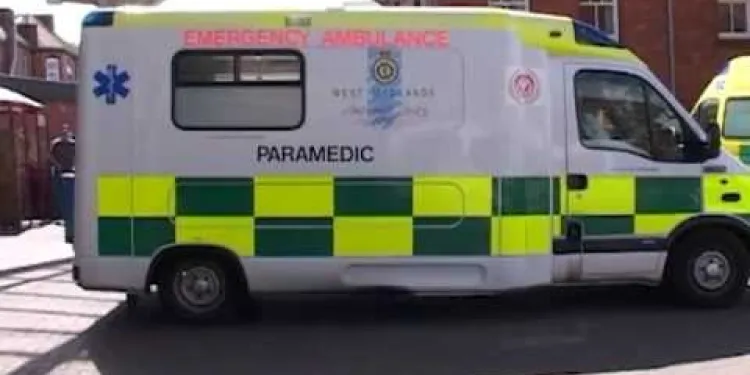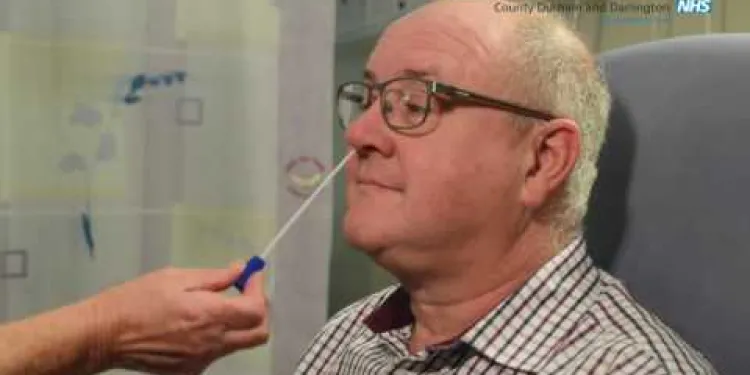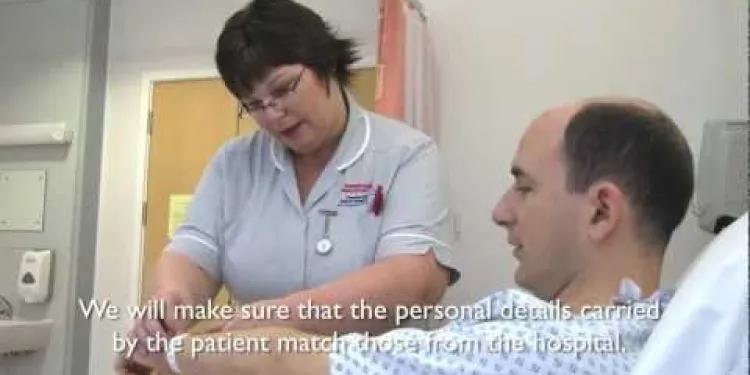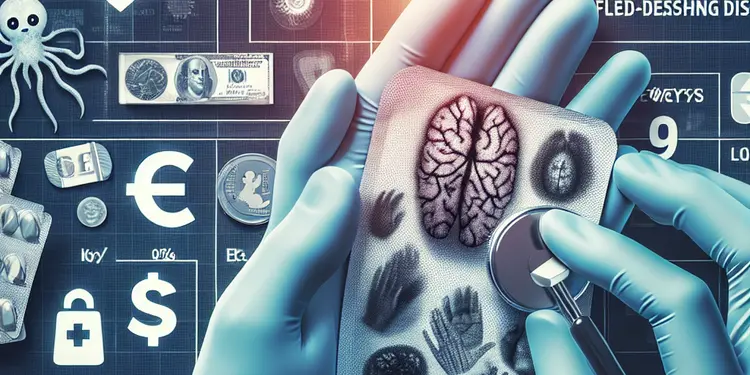Find Help
More Items From Ergsy search
-

MRSA Bug
Relevance: 100%
-

MRSA Screening at County Durham and Darlington NHS Foundation Trust
Relevance: 81%
-

MRSA Screening at Chesterfield Royal Hospital NHS Foundation Trust
Relevance: 81%
-

Is taking antibiotics always bad?
Relevance: 13%
-

2 episodes of cellulitis and been given antibiotics but the redness doesn't seem to be improving?
Relevance: 13%
-

How is flesh-eating disease diagnosed?
Relevance: 7%
-

How is impetigo treated?
Relevance: 6%
-

Why is antibiotic resistance a problem?
Relevance: 6%
Understanding the MRSA Bug
What is MRSA?
MRSA stands for Methicillin-Resistant Staphylococcus Aureus. It is a type of bacterial infection that is resistant to several widely-used antibiotics. This resistance makes it a challenging infection to treat and control. The Staphylococcus aureus bacterium lives on the skin and in the nose without causing harm. However, when it enters the body through cuts or abrasions, it can cause infections.How Does MRSA Spread?
MRSA can spread through direct contact with an infected wound or by sharing personal items, such as towels or razors, that have touched infected skin. In healthcare settings, MRSA is commonly spread via contaminated hands, medical equipment, or surfaces. This makes hospitals, nursing homes, and other healthcare facilities hotspots for MRSA transmission.Symptoms of MRSA Infection
MRSA infections can present in various ways depending on where the bacteria enter the body. Common symptoms include red, swollen, and painful skin lesions that may be filled with pus or other drainage. More severe symptoms can include fever, chills, and signs of a serious infection if the bacteria spread to other parts of the body, such as the lungs or bloodstream.Preventing MRSA Infections
Preventive measures are crucial in controlling the spread of MRSA. Regular hand washing with soap and water, keeping wounds clean and covered, and not sharing personal items can reduce the risk of MRSA. In healthcare settings, stringent hygiene protocols, including the use of gloves and gowns, as well as regular cleaning of surfaces and equipment, are vital.Treatment for MRSA
Treating MRSA can be challenging due to its resistance to many standard antibiotics. However, there are still some effective antibiotics available, such as vancomycin and linezolid. In some cases, healthcare providers may need to drain abscesses or perform other minor surgical procedures to remove infected tissue. It is essential to complete the entire course of prescribed antibiotics to prevent the infection from returning or worsening.The Situation in the United Kingdom
In the United Kingdom, MRSA infections have been a notable concern, particularly in hospital settings. The National Health Service (NHS) has implemented various measures to reduce MRSA rates, including enhanced infection control practices and rigorous cleaning protocols. Public awareness campaigns also emphasize the importance of hygiene and responsible antibiotic use to combat antibiotic resistance.Conclusion
MRSA is a formidable bacterial infection that poses significant health challenges. Understanding its transmission, symptoms, prevention, and treatment is essential for managing and reducing its impact. By adhering to recommended hygiene practices and supporting public health efforts, the spread of MRSA can be minimized, protecting both individual and community health in the United Kingdom.Understanding the MRSA Bug
What is MRSA?
MRSA is a type of germ that can make people sick. MRSA stands for Methicillin-Resistant Staphylococcus Aureus. This germ is hard to kill because it doesn't respond to some medicines called antibiotics. Normally, it lives on our skin or in our nose without causing problems. But if it gets into a cut or a scrape, it can cause an infection.How Does MRSA Spread?
MRSA can spread when you touch an open sore or use things like towels or razors that an infected person has used. In places like hospitals or nursing homes, MRSA spreads from touching things that have germs on them, like beds or equipment.Symptoms of MRSA Infection
MRSA can make the skin red, swollen, and painful. Sometimes, the infection looks like a sore filled with pus. If it gets very bad, it can cause fever and make you feel very sick if it spreads to places like your lungs.Preventing MRSA Infections
To stop MRSA, wash your hands often with soap and water. Cover cuts or wounds with a bandage and don’t share personal items. In places like hospitals, doctors and nurses wear gloves and special clothes and clean things a lot to keep MRSA away.Treatment for MRSA
MRSA is hard to treat, but some medicines, like vancomycin, can help. Doctors might also need to clean out the infection with a small surgery. It's important to take all the medicine the doctor gives you to make sure the infection goes away.The Situation in the United Kingdom
In the UK, MRSA is often found in hospitals. The National Health Service (NHS) is working hard to keep MRSA down by cleaning more and teaching people about hygiene and using antibiotics correctly.Conclusion
MRSA is a tough germ that can make people sick. Knowing how it spreads and how to stop it is important. By keeping clean and following health advice, we can help stop MRSA from spreading and keep everyone healthy.Frequently Asked Questions
What is MRSA?
MRSA stands for Methicillin-resistant Staphylococcus aureus, a type of bacteria that is resistant to many antibiotics. It can cause infections in different parts of the body.
How is MRSA spread?
MRSA is primarily spread through direct contact with an infected wound or by sharing personal items like towels or razors that have touched infected skin.
Who is at risk of getting MRSA?
Anyone can get MRSA, but it is more common in people who have weakened immune systems, people in hospitals or nursing homes, and those who have recently had surgery.
What are the symptoms of an MRSA infection?
Symptoms of MRSA can vary depending on the part of the body that's infected. It often causes skin infections, which may look like boils or abscesses, and can be red, swollen, and painful.
How is MRSA diagnosed?
MRSA is diagnosed by taking a sample from the infected area and sending it to a laboratory for testing to see if the bacteria are present and resistant to antibiotics.
Can MRSA be treated?
Yes, MRSA can be treated with specific antibiotics that the bacteria haven't become resistant to. In some cases, treatment may also involve draining abscesses or other infected areas.
Can MRSA infections be prevented?
Preventative measures include regular hand washing, keeping wounds covered, avoiding sharing personal items, and ensuring healthcare environments follow proper sterilization procedures.
Is MRSA contagious?
Yes, MRSA is contagious and can spread through direct contact with an infected person or contact with contaminated objects and surfaces.
What should I do if I suspect I have an MRSA infection?
If you suspect you have an MRSA infection, consult your healthcare provider immediately for proper diagnosis and treatment.
Can MRSA be found outside hospitals?
Yes, MRSA can be found in community settings as well, known as Community-associated MRSA (CA-MRSA). It can affect otherwise healthy individuals.
What is the difference between MRSA and a regular staph infection?
The primary difference is that MRSA is resistant to many common antibiotics, making it harder to treat compared to regular staph infections.
How long can MRSA survive on surfaces?
MRSA can survive on surfaces and objects like towels, razors, and medical equipment for hours to days, increasing the risk of transmission.
Are there any long-term effects of an MRSA infection?
While many MRSA infections can be successfully treated, some may lead to serious complications such as bloodstream infections, pneumonia, or chronic wounds.
How can hospitals prevent the spread of MRSA?
Hospitals can prevent MRSA spread by implementing strict hygiene protocols, isolating infected patients, regularly disinfecting surfaces, and ensuring staff follow proper hand hygiene.
Is there a vaccine for MRSA?
Currently, there is no vaccine available for MRSA. Research is ongoing to develop effective vaccines and new treatments to combat MRSA infections.
What is MRSA?
MRSA is a type of germ. It can cause infections. This germ is hard to kill with medicine. It can make people sick, especially if they have cuts or wounds.
Here are some ways to stay safe:
- Wash your hands often with soap and water.
- Keep cuts and scrapes clean and covered.
- Do not share towels or sports gear.
- Tell a grown-up if you have a cut that looks red or swollen.
MRSA is a type of germ. MRSA is hard to treat because some medicine does not work on it. MRSA can make people sick in different parts of the body.
How does MRSA spread?
MRSA germs can move from one person to another. Here is how:
- Touching someone with MRSA.
- Touching things with MRSA on them, like towels or gym equipment.
To stay safe, wash your hands and keep cuts clean and covered. Ask for help from a grown-up if you are worried about MRSA.
MRSA is a type of germ that can make you sick. It spreads when you touch a cut or sore that has the germ in it. It can also spread if you share things like towels or razors with someone who has it.
Who can get MRSA?
Some people are more likely to get MRSA. This disease is a type of germ that can make you sick. It is important to know who could get it and how to stay safe.
Here are some people who have a higher chance:
- People who are in the hospital.
- People who have a weak body because they are sick.
- People who have cuts or wounds.
- People who do not wash their hands often.
Washing hands with soap and water can help. Keeping cuts clean and covered is also good. If you are unsure, it can be helpful to ask a nurse or doctor.
Anyone can get MRSA. But it's more common for people who are not very strong, people in hospitals or nursing homes, and people who just had an operation.
What happens if you have MRSA?
MRSA is a type of germ that can make you sick. It is important to know if you have it. Here are some signs:
- You might have red, swollen skin that hurts.
- You might see bumps or pimples filled with pus.
- The area might be warm to touch.
- You might have a fever, which means your body is too hot.
If you think you have MRSA, tell a grown-up or a doctor. They can help you feel better. You can also ask someone to help you read and understand this. It's okay to ask for help!
MRSA can make you feel sick in different ways. It depends on where it is in your body. It often causes skin problems. Your skin might have bumps like boils. The area can be red, swollen, and hurt a lot.
How do doctors find out if you have MRSA?
Doctors use different tests to see if someone has MRSA. They might take a sample from your skin, nose, or another part of your body.
They look at the sample under a microscope or do special tests to see if MRSA is there.
Some tips to help you understand:
- Ask someone to explain the tests to you.
- Look at pictures or videos about MRSA tests.
- Ask a doctor or nurse to show you how the tests work.
Doctors find out if someone has MRSA by taking a small sample from the sore or infected spot. They send this sample to a lab to check if the germs are there and if medicine can help get rid of them.
Can MRSA be cured?
Yes, doctors can help people get better from MRSA. MRSA is a type of germ that can make you sick.
Here are some ways to treat MRSA:
- Medicines: Doctors can give you special medicines called antibiotics that fight the germs.
- Cleaning: Keeping cuts and scrapes clean helps heal them fast.
- Doctor visits: Going to the doctor will help you get better.
Ask a grown-up or a doctor if you need help understanding. You can use pictures or videos to learn more.
Yes, we can treat MRSA with special medicine called antibiotics. Some antibiotics still work because the germs have not learned to fight them. Sometimes, doctors may also need to clean out pus-filled areas or other places that are infected.
How can we stop MRSA infections?
MRSA is a type of germ that can make people sick. There are some simple ways to help stop the spread of these germs:
- Wash your hands well with soap and water. Do this often, especially after touching things that others touch too.
- Keep cuts and scratches clean and covered with a bandage until they heal.
- Don't share personal items like towels or razors.
- Clean shared items and surfaces, like gym equipment, before and after use.
By doing these things, we can help keep ourselves and others safe from MRSA germs.
Ask for help if you need more tips or remind someone to help you remember these tips.
To stay healthy, you can do a few simple things. Wash your hands often. If you have a cut or scratch, keep it covered with a bandage. Don't share personal items like towels or brushes. Make sure doctors and nurses keep everything clean and safe.
Can you catch MRSA from someone else?
Yes, MRSA can spread from one person to another. It can spread if you touch someone with MRSA or touch things or surfaces that have MRSA on them.
What to do if you think you have MRSA
If you think you might have MRSA, tell a grown-up or a doctor. Here are some steps you can take:
- Ask a doctor or nurse for help.
- Keep any cuts or wounds clean.
- Cover your cuts with a clean bandage.
- Wash your hands often with soap and water.
These steps can help you stay healthy. If you need more help, tell someone you trust.
If you think you might have an MRSA infection, talk to your doctor or nurse right away. They will help you know for sure and give you the right medicine to help you get better.
Can someone get MRSA outside of hospitals?
Yes, people can get MRSA outside of hospitals. MRSA is a type of germ that can cause infections. It can be found in places like schools, gyms, and homes. To help stop the spread, wash your hands often and keep cuts clean and covered.
Yes, MRSA can be found where people live and play. This type is called Community-associated MRSA or CA-MRSA. It can make healthy people sick too.
How is MRSA different from a regular staph infection?
MRSA and regular staph infections are both caused by bacteria. The bacteria that cause these infections are called "staph." But MRSA is a special type of staph infection.
Here's how they are different:
- MRSA: This kind of staph is tough because it doesn't get better with some common medicines. MRSA stands for Methicillin-Resistant Staphylococcus Aureus. "Resistant" means it can fight off these medicines.
- Regular Staph Infection: This kind usually gets better with normal antibiotics. Antibiotics are medicines that kill bacteria.
If you want to understand this better, you can:
- Talk to a doctor or nurse. They can explain more.
- Use simple video or picture guides that show how MRSA and staph infections are different.
- Read or listen to information on health websites that are easy to understand.
The main difference is that MRSA is tough to treat because it does not get better with many common medicines. Regular staph infections are easier to treat.
How long can MRSA live on things?
MRSA germs can stay on things for a long time. They can live for days, or even weeks.
Here are some tips to stay safe:
- Wash your hands often with soap and water.
- Clean surfaces that people touch a lot.
- Use hand sanitizer when you can't wash your hands.
MRSA germs can live on things like towels, razors, and medical tools for a long time. This means you can catch it from these things.
Can MRSA make you sick for a long time?
If you have MRSA, it can make you sick for a long time.
MRSA is a type of germ that is hard to kill.
It can sometimes cause problems in your body for a while.
To help, you can:
- Go to your doctor. They can give you special medicine to help.
- Wash your hands often. It keeps the germs away.
- Keep any cuts or scrapes clean.
Doctors can often help treat MRSA infections. But sometimes, MRSA can cause big problems. It can get into the blood, make it hard to breathe, or cause sores that don’t heal.
To help with reading, you can use tools like text-to-speech to listen to the words. Highlighting important words and breaking sentences into smaller parts can also be useful.
How can hospitals stop MRSA from spreading?
MRSA is a type of bacteria that can make people very sick. It spreads easily in hospitals.
Here are some ways hospitals can help stop MRSA:
- Wash hands often with soap and water.
- Clean hospital rooms and equipment every day.
- Wear clean gloves and gowns when helping patients.
- Make sure doctors and nurses use masks if needed.
- Check patients for MRSA when they come into the hospital.
These steps help keep everyone safe and healthy.
Hospitals can stop MRSA from spreading by doing these things: keeping everything very clean, keeping sick people away from others, cleaning surfaces a lot, and making sure everyone washes their hands properly.
Is there a shot for MRSA?
Right now, there is no shot to stop MRSA. People are still working on making new shots and medicines to help fight MRSA germs.
Useful Links
Have you found an error, or do you have a link or some information you would like to share? Please let us know using the form below.
-->
This website offers general information and is not a substitute for professional advice.
Always seek guidance from qualified professionals.
If you have any medical concerns or need urgent help, contact a healthcare professional or emergency services immediately.
Some of this content was generated with AI assistance. We’ve done our best to keep it accurate, helpful, and human-friendly.
- Ergsy carfully checks the information in the videos we provide here.
- Videos shown by Youtube after a video has completed, have NOT been reviewed by ERGSY.
- To view, click the arrow in centre of video.
- Most of the videos you find here will have subtitles and/or closed captions available.
- You may need to turn these on, and choose your preferred language.
- Go to the video you'd like to watch.
- If closed captions (CC) are available, settings will be visible on the bottom right of the video player.
- To turn on Captions, click settings .
- To turn off Captions, click settings again.
More Items From Ergsy search
-

MRSA Bug
Relevance: 100%
-

MRSA Screening at County Durham and Darlington NHS Foundation Trust
Relevance: 81%
-

MRSA Screening at Chesterfield Royal Hospital NHS Foundation Trust
Relevance: 81%
-

Is taking antibiotics always bad?
Relevance: 13%
-

2 episodes of cellulitis and been given antibiotics but the redness doesn't seem to be improving?
Relevance: 13%
-

How is flesh-eating disease diagnosed?
Relevance: 7%
-

How is impetigo treated?
Relevance: 6%
-

Why is antibiotic resistance a problem?
Relevance: 6%

